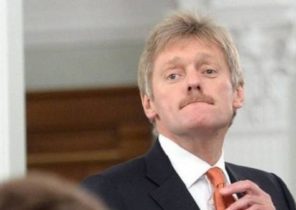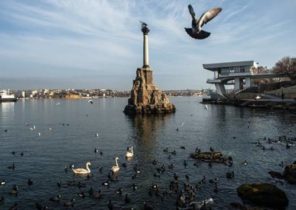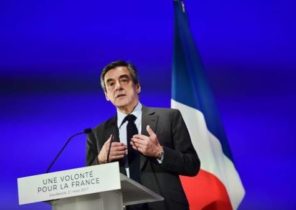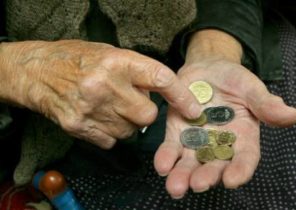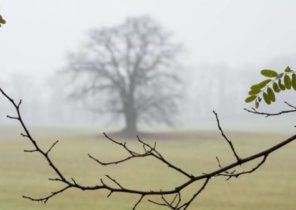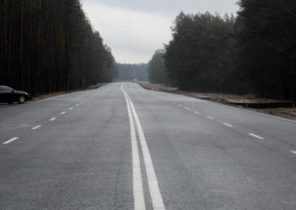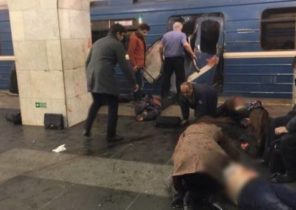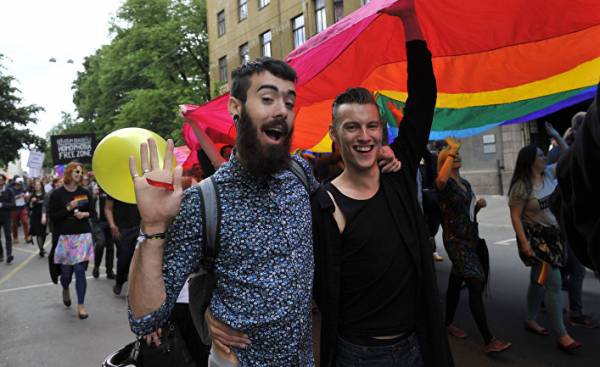
The theme of Russian influence in Latvia — including in the form of “soft power” — in recent years, we constantly hear in the media and political discussions. But the interests of other countries are not represented by a single Kremlin: embassies, institutes of culture and other Western countries spend a lot of effort and money to promote their languages and values. With the help of unusual holidays, special events, and compelling scholarships ori seek to win the sympathy of the inhabitants of Latvia. The portal Delfi has studied how people use the “soft power” allies of Latvia in EU and NATO.
Soft power (soft power) — a form of foreign policy strategy, involving the ability to achieve the desired results on the basis of voluntary participation, sympathy and attractiveness, in contrast to “hard power,” which implies coercion.
March 8, Beaujolais, burgers and Russian language of Latvian schools
“If you want to allow to study the Russian language as the first foreign language in Latvian schools?”. If the debate on this subject in the Ligo hall of the House of the Riga Latvian society was organized, for example, the Society of lovers of Russian culture “World. Way. Agreement” or the Latvian Association of teachers of Russian language and literature (lapal), you can only imagine how he reacted to the Latvian part of society. But this topic was chosen for the youth debate a month ago, the Goethe Institute. Won Maxim Karpov, who defended the position of “for”. Now he will represent Latvia in the international finals. The event was held in German language.
The Swedish Embassy said on 8 March with a round table on gender equality. Invited 15 ladies — representatives of different ministries, universities and NGOs, congratulated them on the holiday. The representative of the Ministry of education was not happy about this — she said that he will take March 8 the Soviet legacy. For the Swedes it’s a big day, because feminism is part of the public policy of the Kingdom, which they are really proud of. The event was held in English.
If such Western values as equality and tolerance in Latvia is still moving with difficulty, to join the mass celebrations, even in a foreign language residents of Latvia are always ready. For example, to dance on St. Patrick’s Day with green beer, black pudding and wishes to magicians-leprechauns. Or to join the festival “Walpurgis night” in the Ethnographic Museum under the leadership of the Swedish Embassy and the society “Latvia-Sweden”. With the coven in this country, the holiday is generally not associated, there is just a meeting of spring with songs, or soup and pies. Well Holy cause to celebrate with the French the day of the Beaujolais (wine, of course) and the Americans independence Day (hamburgers).
Not less popular among Latvian youth option — quotas and scholarships in a foreign University. First you need to pass the language exam on internationally accepted standards (it is expensive). The easiest way (though completely optional) to do this after language courses (paid) in the same institution where they will have to answer (in the French Institute, the Goethe Institute, the Baltic Council for international education). There is free will inform you about the possibilities to continue education abroad or do a student exchange for a limited period.
Return whether a student in Latvia? Some of them come back. But many ambitious and motivated young people with knowledge of languages perfectly arranged in richer countries. If returned, the ties with the country of welcome and of thanks to it is not lose, that is, become a kind of goodwill ambassadors took their powers.
With many of these agencies have their own cultural centres and libraries in which all available historical and contemporary materials about the country. From time to time themed gatherings for adults and children.
All this activity is financed, as a rule, from the budgets of Western countries. Sometimes the events are funded by private sponsors and funds of those countries, something financed jointly with Latvia, where the participants have to pay a nominal fee. Language courses such structures are usually not cheap.
Sweden: “green light” to feminism, right bees, the best country in the world
The promotion of Swedish values and culture in Latvia engaged in five people in the Swedish Embassy, the Swedish trade Council and investment by Business Sweden, the Stockholm higher school of economy and society “Sweden-Latvia”.
In ten cities of Latvia — Riga to Ludza — every year, the Days of Sweden, which attracts over 15,000 people a year. Also in different cities periodically organize festivals Swedish films, Swedish language courses, the annual concert of St. Lucia, the festival of Walpurgis night. Tent Swedish music usually open at Positivus festival, there is a Swedish tent at the festival Lampa (this year there will discuss the question “is it Necessary to financially punish the media who spread false news?” and will give a lecture “making Sweden the best country in the world?”).
“In the humanitarian policies it is important for us to pursue themes of gender equality, protection of the environment, climate and strengthening cohesion in the European Union”, — reported in the Embassy. It is with these objectives there conducted a round table on March 8 and will organize a seminar with travel to Sweden on gender equality. Recently in the courtyard of the Embassy has established an environmentally-demonstration bee hives. There is no doubt that, despite the harsh urban conditions, these bees will produce the right honey.
According to employees of Embassy, priorities and areas of humanitarian and cultural activities are developed in the Ministry of foreign Affairs of Sweden, but more importantly, “to the event was interesting for Latvian audience.” Separate organizations for the study of the Swedish language in Latvia no, but in the Latvian universities this language study approximately 650 students today, such knowledge is in high demand in the labour market.
“Relations between our countries closely, as it was confirmed at the Embassy. — Exchange is carried out at all levels. A lot of Latvians working in Sweden. About 40% of inhabitants of Latvia have visited Sweden, including more than half of the residents. We support this, but most of the contacts occurs without the help of the Embassy. Also the Embassy does not provide assistance to people wishing to move to Sweden, but answers all the questions”.
Germany: a balm for the historical trauma, acute topics and German traces in Latvia
The German Goethe Institute funded by the government of Germany, operates in Latvia since 1992). He is the successor of the German Academy, founded in 1925 for the training and raising of qualifications of foreign teachers of German and germanists, it successfully does to this day.
For six years the Institute has been conducting a campaign to promote the German language in kindergartens and primary schools. Including thanks to it the number of people wishing to learn the language has grown significantly. The Institute for language courses to 1500 students per year. Lesson promising — it opens up opportunities for free higher education and work in Germany.
Every year the Institute selects approximately 50 scholarships of 2,000 euros for the program of learning the language. German is taught to people in certain professions (currently, physicians) and organizations (the Latvian Ministry). It is also possible to pass a language exam and receive an international certificate.
Much attention is paid to cultural cooperation. For example, the Institute participated in creating the interactive app “German traces in Latvia” — it can be used to monitor the Latvian part of the life of composer Richard Wagner and architect von Gerkan. More than ten years the Goethe Institute holds a debate among students on pressing political issues related to the life of the schools of Europe, human rights and historical injustice.
In previous years, we discussed these questions: “do I Need in Latvia again to introduce conscription?”, “Do I need to enter in Latvia direct presidential election?”, “We need to legalize in Latvia, same-sex unions?”, “Do I need to enter in Latvia the ban on the wearing of clothing that completely conceals the face?”. Question this year: “if you want to allow to study the Russian language as the first foreign language in Latvian schools?” turned out to be acute even for the participants of the debate. One of the finalists has refused the review Delfi.
This year the Goethe Institute has supported the project “Your memories for the future of Latvia”, in which people are encouraged to share stories about his past. On the basis of Theatre street Gertrudes made an unusual documentary production of “the birthday Tanya”: invited people of different nationalities sit down at the dinner table may 9, and share stories that divide and unite.
Last year the Institute has attempted to dive into the memory of the people of Latvia through public discussion “Trauma, memory and the future”, raising questions such as “Can there be a “wrong” memories, what if the memories of different people about Latvia and its history differ from each other?” “What memory is needed for the future of Latvia?” Under its auspices were filmed a series of videos on “Refugees, migration, political exile,” which combined history who emigrated during the second world war the Latvians and the modern refugee in Latvia from the Middle East and Russia.
Another interesting program of the Goethe Institute — Empowering Spaces — helps to bring life back to vacant deteriorating buildings of Riga, to which the owners hands do not reach. In addition, the Institute organized in Riga many conferences, colloquiums, lectures, readings, film programs, photo and art exhibitions, supports the creation of theatrical performances, creative workshops and concerts with participation of Latvian and German artists and experts. During the year, realized about 50 projects with the participation of 50 thousand people. Themes are developed in the parent Institute in Munich, the regional — in Prague, in cooperation with Latvia. All the in German money.
In the library of the Institute you can get all information about Germany, including, through the electronic catalog. All can read and watch for free. To receive materials at home need a subscription, which costs 7-8 euros and free for students courses.
United Kingdom: hunters of the opportunities, spiritual cockroaches and education in the English style
Established in 1934, the British Council administers the cultural and educational ties of the Kingdom in more than hundred countries around the world. The last 25 years, he works in Latvia. “Using the resources of the cultural sphere of the United Kingdom, we are engaged in a constructive dialogue with the state, creating relationships, trust and the ability to improve the quality of life”, — said the Director of the BS Zane Matisovich. At full employment Council operates just two people.
According to Mateevici, the Council does not receive money from the Latvian side, and with the British — 18%, and the rest on its own — language courses, exams, education and cooperation with different organizations and sponsors.
Last year the British Council in the Baltic countries began to implement a program to support educational, artistic, cultural and social entrepreneurship, which helps develop in children and adults the skills needed in the 21st century and to unite society. In schools this program will help to improve the teaching of English, to raise the critical thinking and activity of students, to Orient them to the European values.
Over the past year the Council has supported more than 25 projects with funding from 10% to 100%. Including School leaders debates, youth camp “School hunters opportunity” in Latgale with the participation of journalists, politicians and career consultants, the seminars “a Complete thought” and “Pure facts” in which students are taught to understand media materials, integration project Izzināt. Pieredzēt. Rīkoties — for students of schools of national minorities so that they connect the life of the country, as well as a project for educators on the transition to the system of competencies, which for many years carried out in England.
The British Council supported and unusual setting Dirty Deal Teatro, which is June 30 show at the Festival communication Lampa — Dvēseļu utenis (something like a “Flea market of souls”) — with allusion to the banned in the Soviet Union historical novel by Alexander grin “Dvēseļu putenis” (“Souls in a Blizzard”). Green is a struggle with the invaders of Latvia, and in this production — combating stereotypes and myths about national identity.
Only projects of the British Council in Latvia last year was involved in 13, 000 students and young people conducted 64 events, which collected more than 160,000 spectators. Thus, the British Council focused mostly on socio-cultural activities, moving away from the organization of language courses and certification exams IELTS this feature, they have delegated the Baltic Council for international education.
USA: study at the expense of Franklin, a startup in Seattle, and students with American families
The popularization of American humanitarian and cultural policy in Latvia are the Department of press and culture U.S. Embassy, a reading room, John. F. Kennedy in the Castle of light and the American corner at the Library of Daugavpils.
In the educational centre Education USA Center at Riga business school students can find all information about education in the United States. In particular, there you can talk to a representative of FLEX program, in which high school students for a year free study and live in American families — they paid all the expenses. Last year in the United States went 12 students, this year allocated 14 seats. More short term — month exchange program for students and teachers SUSI, as well as the annual competition for the scholarship of Benjamin Franklin, in which 17 students traveling to the U.S. to learn about American culture and to cultivate leadership qualities.
The most famous exchange program — Fulbright (Fulbright Fellowship), where each year approximately seven students and researchers from Latvia are going in the United States and seven Americans travel to Latvia. Since 1991 this chance to learn and to work in American universities had to use 196 of Latvians, including the first and only Russian Minister of Latvia Vyacheslav Dombrovsky.
With the support of U.S. schools each year are working two or three assistant teachers of English — this year they are helping to teach in Saldus, Madona and Rezekne. The support of the Americans teaching at Latvian universities. For example, this year in Daugavpils University there is a Professor of American literature. There are programs for teachers of English who want to visit the U.S. to learn new ideas and teaching methods. One of them is Teaching Achievement Exchange program (TEA).
The program “Meet America” gives an opportunity for Latvian students to meet with Americans of different professions — diplomats, students, teachers, athletes, etc. — to learn about American culture and society, to discuss different topics — “Personal development and goal achievement”, “Stereotypes about Americans”, “career”, “Personal branding”, etc. this year, the programme reached 8 000 learners from Ludza to Liepaja.
One of the most popular — launched three years ago, the youth development program of Start Strong, which gives students practical skills for the job search: interview preparation, personal branding, writing a CV. It helps to set a goal and develop entrepreneurial skills. This year the project of Start Strong Start Up more than 180 students from Latvia and Lithuania were three modules with Latvian entrepreneurs and tried to develop their ideas for products and business. The winners received paid by the Embassy trip to Seattle, where he met with other budding entrepreneurs and learn more about the American style of doing business.
Through the small grants Program and the Department of press and culture Embassy supports a number of cultural events and festivals in Riga and small towns of Latvia. For example, touring hip-hop group from Texas, bluegrass (the music genre area of the Appalachian mountains, with Celtic roots — approx. ed.), groups from Boston, the world famous American chef with a culinary program. One of the last events — a concert by American singer Mary McBride at the opening of the season Kalnciema quarter. After that she went to Baltinava and Ludza with free concerts and creative workshops for American rock music.
Most of the American programs (but not all) are in English and are paid from the funds of the U.S. government, some in co-financing from the Latvian side. As assured by the U.S. Embassy in Riga, “all of our programs support the strong relationship that exists between the U.S. and Latvia in the framework of the Transatlantic values, which include human rights, democracy, freedom of expression, gender equality and so forth.”
France: late brunch with French and francisloco for the traveler
The most striking the distribution of the Francophonie in Latvia — Institute of France — does not change the usual image of the country. Support all the wonderful cultural events related to fashion, art and, especially, gastronomy.
For example, in the spring to mark the 20th anniversary of its representative office in Latvia, the Institute of France threw a Grand Gastronomic festival with the screening of documentaries and feature films about the different countries of the world, lectures by famous chefs and culinary surprises. Including with cinema events dedicated to the gastronomic culture of France from the Director of the Institute of France in Latvia of Jules Beviale and chef Jeremie Fontaine, a student of the famous Alain Ducasse, as well as French series “Sirmais. Cult food” from the Latvian Grand chef Martins Sirmais.
Through the stomach and lovely Institute seeks interest in the French language. The range of language courses Institute course, “wine Culture” — 25 euros two hours: tasting + terminology (basic knowledge of language required). There are such exciting options as “Saturday brunch with the French” — two hours for € 19 (here the knowledge is needed — from level A2.1). There is French in the form of creative pursuits — theater workshop and an art Studio.
Garnish the French language can become more deep knowledge about the country: students of the cycle of French civilization are introduced to the legendary brands, including Renault, Michelin, l’oréal, Danone, Yves Rocher, etc., politicians and the great inventions. If, however, at such depths there is no time and effort, you can limit the “Alphabet of the French language for the traveler” and to go to one of 30 countries where this language is the national language or is widely used. And, of course, in the range — the widest selection of regular courses and the only examination centre where you can get recognized for foreign language diplomas: DFP, DELF-DALF.
The Institute also conducts concerts, exhibitions, meetings Francophones, “Afternoon tales” for children, science cafes, film nights to movie lovers. Well, and elegant Library, in which more than 13 000 “exhibits” in paper and electronic format, movies, music, literature and training materials. On the place they can be free to put to the house must have a library card for 25,50 euros per year.
On Thursdays from 15 to 18 at the Campus France information centre you can learn all about education in France. In the universities of this country receives annually more than 200 Latvians. Each year the French government awards scholarships to students from Latvia to study in a magistracy or doctoral studies in France. Offered cooperation in the fields of science (ex-Latvian research project “Osmose”), higher education (scholarships for master’s degree students and doctoral cooperation between Central school of Nantes and the MOUTH), as well as the exchange of experience between French and Latvian specialists in the emergency services, cooperation between government property administration and General service Directorate of the administration in France and between the French and Latvian television.
The scientist: the activity of Western ‘soft force’ leads to the outflow of young people
Dean of the faculty of social Sciences, the political scientist Juris Rozenvalds does not see “soft power” of the West is nothing dangerous to Latvia: “it is Quite natural that each country has certain interests and the desire to protect them, but still “soft power” of the West is not contrary to our values and not intended to undermine international norms. In fact, Russia’s desire to communicate with Russians living in Latvia, too, there is nothing wrong with that. The question is, how to use and what values to espouse. If we all sorts of tricks trying to convince them that “our Crimea”, that Russia’s foreign policy is all right, when there is a desire to influence the outcome of elections in another country — nothing good about this fellowship can not be.
In the discussion of the question, “do I Need to allow to study the Russian language as the first foreign language in Latvian schools?” I see nothing inappropriate is a completely legitimate question. Regardless of what Russia is doing, Russian-speaking Latvia — our neighbors. The Latvians have a good definition kaimiņu būšana: no one is questioning the state status of the Latvian language, but this does not mean that the young person should not know the language of his neighbor. And nobody canceled the significance of the great Russian culture, the key to which gives language.
My students, especially scientists, I say that it is a question of their aptitude to write something about political developments in Latvia, not knowing the Russian language and not being interested in what he says, thinks and laughs or cries such a large community of Latvia is not very professional. According to statistics, 40% of the population attends events that are not in their native language. For example, at the concert “time Machine” I’ve heard a lot of Latvian speech. And that’s good.
You can say that the activities of Western “soft forces” (scholarships in universities, the ability to learn languages, beautiful positioning of countries, etc.) leads to an outflow of our youth. But by and large, the question remains whether our young people at home or prick somewhere to ski, is determined not so much to offer the Swedes or the Germans as a response to the question, I feel if our young people their involvement in Latvia and how they are comfortable here. Our active emigration suggests that there was an unpleasant to the Latvian state inertia: that better not be here. Unfortunate, but this can not blame others.”
